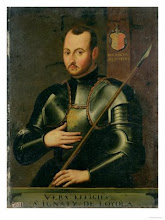July 1, 2015 — Last month in Rome, Oscar-winning Italian composer Ennio
Morricone premiered his first-ever Mass honoring Pope Francis and the Jesuits.
The performance took place in the Jesuits’ spiritual home in Rome, Church of
the Gesu, where St. Ignatius of Loyola is buried. Jesuit Father Adolfo Nicolás,
Superior General of the Society, was in attendance, along with former Italian
president Giorgio Napolitano and hundreds of Jesuit alumni.
A parishioner at the historic church, Morricone composed the Mass to
mark the 200th anniversary of the restoration of the Jesuits in 2014; due to health
setbacks, he delayed the premiere a year. The Society of Jesus had been
suppressed by Pope Clement XIV in 1773, forcing Jesuits throughout
the world to renounce their vows and flee in exile. The suppression lasted
until 1814, when Pope Pius VII restored the Society.
This was not Morricone’s first encounter with the Jesuits: he wrote the
score for the 1986 Academy-Award-winning film “The Mission,” which chronicles
the life of an 18th-century Jesuit priest in South America and the events that
eventually lead to the suppression. The significance was not lost on Morricone. “In some way
I have participated in their dissolution and now I participate in the
celebration of the 200th anniversary of their restoration,” said the
86-year-old conductor, who dedicated the Mass to Pope Francis. “I find in all
of these coincidences what I would call almost miraculous.”
In his first-ever composed Mass, Morricone both experimented and
remained true to liturgical tradition. For example, the notes on the first
pages of the score form three successive crosses, the composer told Vatican
Radio. These accompany the chorus’ antiphonal chanting, which Jesuit Father
Michael Rogers said “evoke meditation of the Incarnation as in the Spiritual
Exercises of St. Ignatius.”
Fr. Rogers, who attended the debut, said he thought the concluding
movement picked up on the score of “The Mission” and was “the best version of
the theme I’ve ever heard.”
At the premiere, Morricone conducted the
Roman “Sinfonietta” orchestra. A dual chorus of 100 members from the
National Academy of St. Cecilia and the Rome Opera was directed by Stefano
Cucci.
Watch a recording of the mass from the Italian TV station RAI below:





.png)






No hay comentarios:
Publicar un comentario